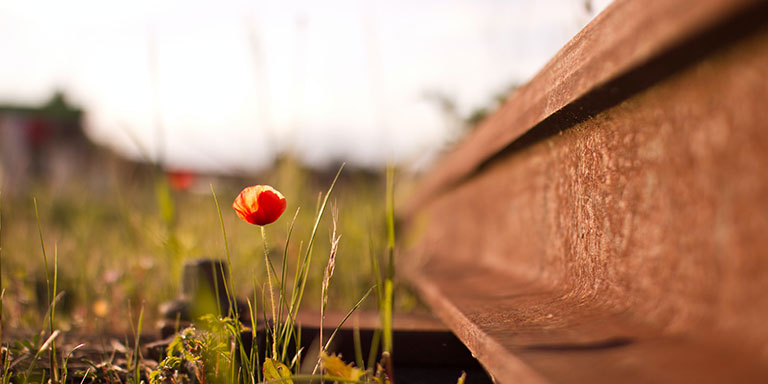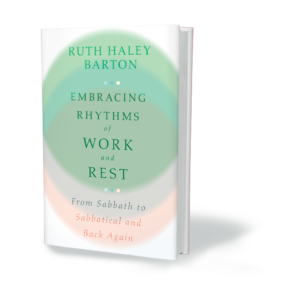
Finding Freedom Through Sabbath Resistance
“If you aren’t resting, you are a slave to something.”
– Adele Calhoun
We tend to think of sabbath as being mostly about rest and replenishment—and it is!—but if that’s all we emphasize, it can come across as being rather soft. For those who were first given the gift of sabbath, it was so much more than that: it was the sign, symbol, and lived reality of their resistance to and liberation from oppression.
To fully understand the meaning of sabbath we must locate it within the Exodus narrative, within the lives of real people in a real time and place, who were given a way to practice resistance to the cultural realities that were enslaving them.
Sabbath as Liberation
When instructions were first given for sabbath-keeping in Exodus 16, God was communicating in the strongest possible terms that God’s people were now free—free from all aspects of their bondage to the Egyptians. For many years the Israelites had been captive to Pharaoh’s system of endless production that was legitimized by the gods Pharaoh worshiped. It was a secure existence but they had no personal freedom, and especially not the freedom to take a day of rest. Pharaoh, who was nothing more than a hard-nosed production manager, kept increasing their quotas in order to amass his own wealth; Exodus 5 is a brutal description of a relentless production schedule in which rest was impossible and disallowed.
As slaves in Egypt, the people of Israel were always at the mercy of the demands and expectations of a relentlessly consumeristic and opportunistic ruler who cared nothing for their well-being. But now . . . now that they had been freed from their bondage, they were being guided into a way of life that worked for them, by a God who knew them and loved them and only wanted to give them the very best. Walter Brueggemann writes,
Into this system of hopeless weariness erupts the God of the burning bush (Exodus 3:1‑6). That God heard the despairing fatigue of the slaves (2:23‑25), resolved to liberate the slave company of Israel from that exploitive system (3:7‑9), and recruited Moses for the human task of emancipation (3:10). The reason Miriam and the other women can sing and dance at the end of the exodus narrative is the emergence of a new social reality in which the life of the Israelite economy is no longer determined and compelled by the insatiable production quotas of Egypt and its gods (15:20‑21).
It should not escape our notice that when the Ten Commandments (including the sabbath) are introduced for the first time, God begins by saying, “I am the Lord your God who brought you out of the land of Egypt, out of the house of slavery” (Exodus 20:1‑2). There are many other ways their Deliverer could have been identified, but in choosing this emphasis the Israelites are reminded of a core piece of the Holy One’s identity—that of a liberating God who freed them from bondage to Pharaoh and to a system that only valued them according to what they could produce.
In giving them the sabbath, God is connecting the dots between the experience of being delivered from oppression and the principles and practices that will undergird a whole new way of life; after all, those who are used to living in bondage do not know how to live as free people until someone shows them. The very same God who was free to rest from work on the seventh day would now be known as the God who emancipates God’s people from bondage to a system that enslaved them. No wonder Walter Brueggemann states that “the fourth commandment is the most difficult and the most urgent of the commandments in our society . . . because it defies the most elemental requirements of a commodity-propelled society specializing in control and entertainment, bread and circuses . . . along with anxiety and violence.”
Freedom Journey
Considered in this light, there is nothing “soft” about sabbath. By instituting the sabbath, God intervened in human history to make right something that had gone terribly wrong and re-established a pattern present in creation that had been tragically lost. In the Exodus narrative, the God who is free to rest on the seventh day is calling the people God loves to participate in his freedom by embedding it in their national identity.
Does anything about this reflection on Israel’s enslavement remind you of the bondage many of us are experiencing today within our current culture—bondage to patterns of relentless productivity, never-enough consumerism, the constant stimulation of push notifications and connectivity that exacerbates stress, anxiety, and bitter controversies? Is there anything about the description of God as one who emancipates and frees people from their bondage that offers hope that we could be freed from our bondage as well?
In Jewish tradition, sabbath contains a strong element of resistance to the prevailing culture, and to the gods within that culture, as allegiance is proclaimed to the God who is our God. The practice of sabbath-keeping was and is an act of resistance against a culture that brainwashes us into thinking that good things come only through unceasing determination, tireless human effort, and always being plugged in. And it’s not just an act of resistance against forces that are external. Our practice deepens as we recognize and resist the internal drivenness, self-determination, and individualism that has been planted and cultivated in us. Our resistance is solidified as, one day a week, we take ourselves out of the soupy mess this potent combination has us swimming in.
One day a week we practice trusting in God as our ultimate strength and provider rather than putting all our faith in what we can secure for ourselves through our 24‑7 striving. We practice humility and dependence on God as we settle into the limits of our humanity and rest one day a week. Remembering how we used to live and how God has freed us from our bondage leads quite naturally to delight and devotion as we determine once again that we will not get sucked back into a life of non-freedom. Sabbath is first and foremost about the freedom to live our lives on God’s terms for us rather than living in bondage to anyone, anything, or any culture. It is about the God who is free to cease laboring and to rest, marking out a path for us to live in freedom as well.
Not for the Privileged Few
One concern we might have about sabbath-keeping is that it smacks of privilege, an impossibility for those living in poverty, working multiple low-paying jobs to make ends meet. It is important to realize that this is an issue created by our current culture, not one created by the practice itself as God gave it.
In its original context, sabbath was intended to be the great equalizer, ensuring that all God’s creatures—including the animals!—would receive the benefits of this life-enhancing pattern. “Six days you shall labor and do all your work. But the seventh day is a sabbath to the Lord your God; you shall not do any work—you, or your son or daughter, or your male or female slave, or your ox or your donkey, or any of your livestock, or the resident alien in your towns, so that your male and female slave may rest as well as you.” (Deuteronomy 5:13‑14)
The reference to slavery is uncomfortable in light of current sensibilities, but let’s not miss the point—that regardless of gender, family position, socioeconomic status, citizenship, or even animal species, sabbath is for all God’s creatures. Kelly Kapic writes,
One of the most countercultural and radical ideas in the Bible, when compared with the ancient world, is the sabbath. One day a week you do not have to work [and] the Jews were thought lazy because of it. While those in power could rest when they wanted, slaves and peasants were often unprotected from the demands for endless labor, a terrible burden still on the poor of our day who have multiple jobs to make ends meet or are trapped in other modern forms of slavery.
Some of us have been alive long enough to remember a time when Sundays were different from the other days, and as a culture we upheld a form of sabbath: commerce ceased, most businesses were closed, and most sports teams did not compete. Whether you were religious or not, cultural practices generally supported this rhythm for everyone.
We are far from that reality today and there is great loss of support for this practice. Objections about sabbath as an expression of privilege emphasize current cultural realities over the very essence of sabbath as God has given it—as though cultural realities are more significant than God’s intentions. In some ways it doesn’t really matter that today sabbath feels like privilege, as though the way it feels to us makes it so. As Dorothy Bass states so compellingly, “When we keep a Sabbath holy, we are practicing, for a day, the freedom God intends for all people.”
Towards a Sabbath Economy
Norman Wirzba, a professor at Duke Divinity school who pursues research and teaching at the intersections of theology, philosophy, ecology, agriculture, and environmental studies, goes even further. He articulates the idea of a sabbath economy in the spirit of our God who executes justice for the oppressed, gives food to the hungry, sets prisoners free, and lifts up the bowed down (Psalm 146:7‑9). He defines a sabbath economy as one that will have
the equitable distribution of resources as a foremost goal. As the ancient Israelite model makes clear, “equitable distribution” does not mean that all people must enjoy the same or the same amount of goods. Uniformity is not the goal. What is crucial is that we be attentive to when we have enough and fully alert to when others do not have basic needs met. Just as the Israelites were aware that land (wealth) accumulation meant that others were pushed into states of deprivation and want, so we too must guard against the kinds of inequities that further diminish the capacities of others to live well.
We might not know exactly how to bring about this kind of equality in our current culture, but that does not change the fact that in God’s economy sabbath is the great equalizer—the great leveler—and it is our job to figure out how to make it so today. A faithful sabbath practice actually calls us to it.
A Time for Remembering
In the book of Deuteronomy, Moses gives a retrospective on his life in leadership and reflects on the Israelite journey and that pivotal moment when God gave them the Ten Commandments. With the benefit of hindsight, he contextualizes the sabbath even more firmly within this theme of liberation and radical equality. “Remember that you were a slave in the land of Egypt, and the Lord your God brought you out from there with a mighty hand and an outstretched arm; therefore, the Lord your God commanded you to keep the sabbath day” (Deuteronomy 5:6, 15, emphasis added).
Taking our cues from Moses, we see that one of the main functions of sabbath-keeping is to give us a regular, built-in opportunity for remembering who we are and to whom we belong. No matter how enslaved we’ve been during the week, on the sabbath we remember our true identity as free people. We remember how God has been with us, liberating us in the first place, and we find our freedom once again so we can continue to live on God’s terms for us. Cole Arthur Riley, the creator of Black Liturgies, says,
When we rest, we do so in memory of rest denied. We receive what has been withheld from ourselves and our ancestors. And our present respite draws us into remembrance of those who were not permitted it. . . . When I rest my eyes, I meet those ancestors and they meet me, as time blurs within us. They tell me to sit back. They tell me to breathe. They tell me to walk away like they couldn’t. Rest is an act of defiance. . . . It’s the audacity to face the demands of this world and proclaim, We will not be owned.
Practicing Resistance
We too are enslaved to many deadening aspects of life in our culture and the practice of sabbath illuminates our path to freedom. If we look a little closer at the sabbath in its original context we notice that it is really a tale of resistance. To practice sabbath, we need to know what we are in bondage to—what has us in its grip—and that is precisely the thing we should cease. We need to know what wears us out and what wears us down—what robs us of our joy and peace— and cease that, because that is exactly what God wants to free us from.
Adapted from Embracing Rhythms of Work and Rest by Ruth Haley Barton. © 2022 by Ruth Haley Barton. Used by permission of InterVarsity Press. www.ivpress.com.
Keep exploring these topics by reading the book and listening to our podcast:

Listen in as Ruth Haley Barton and guest Cole Arthur Riley have a conversation around whether sabbath is just for the privileged few. Listen to Season 17: Episode 3 | Sabbath as Resistance
 In Ruth’s conversation with pastor Rich Villodas, they discuss the power of a community oriented around sabbath and ideas his church is exploring as they try to make rest available to everyone. Listen to Season 17: Episode 10 | Fruit and Frustration: Creating a Culture Where Everyone Can Rest
In Ruth’s conversation with pastor Rich Villodas, they discuss the power of a community oriented around sabbath and ideas his church is exploring as they try to make rest available to everyone. Listen to Season 17: Episode 10 | Fruit and Frustration: Creating a Culture Where Everyone Can Rest
 The Goodness is in the Rhythm
The Goodness is in the Rhythm
In her new book, Ruth Haley Barton offers hard-won wisdom regarding the rhythms of work and rest. Now available where you buy books.
Our ministry is supported by our readers. When you buy something using book links, we may earn a small commission.
Join thousands of pastors and spiritual leaders
Receive Beyond Words®, reflections on the soul of leadership. Written by Ruth Haley Barton, each reflection provides spiritual guidance and encouragement for those seeking to be in God for the world.


The information in this letter is on target, but I would remind you that the fourth commandment is very specific.
Exo 20:8 Remember the sabbath day, to keep it holy.
Exo 20:9 Six days shalt thou labour, and do all thy work:
Exo 20:10 But the seventh day is the sabbath of the LORD thy God: in it thou shalt not do any work, thou, nor thy son, nor thy daughter, thy manservant, nor thy maidservant, nor thy cattle, nor thy stranger that is within thy gates:
Exo 20:11 For in six days the LORD made heaven and earth, the sea, and all that in them is, and rested the seventh day: wherefore the LORD blessed the sabbath day, and hallowed it.
There is no mention of observing any day as a sabbath.
God does not change🙏🏾🙏🏾🙏🏾
In the midst of listening to your Season 17, I heard this episode of Glennon Doyle’s podcast: No More Grind: How to Finally Rest with Tricia Hersey. Tricia talks about her new book, Rest Is Resistance: A Manifesto. I found it so interesting how many of her insights resonate with yours, Ruth. You’re probably already aware of her work, but if not, I’d commend that podcast and Tricia’s work to you. You’re kindred spirits, it seems, coming from different angles at the same deeply important need and practice of rest.
Shaking my head: https://www.cnn.com/2022/11/03/opinions/rest-is-resistance-so-is-childlessness-stewart/index.html
Yes, I do know of her work and have listened to this podcast and really appreciated it. I just looked up Tricia’s book on Amazon and see that it came out the same day as mine! What are the chances?:) I wish i had known of her work while I was writing my own book so I could have quoted her. Interestingly, for the past 20 years I have identified myself as the “Director of Naps” when I teach about rest so yes, we are definitely kindred spirits!